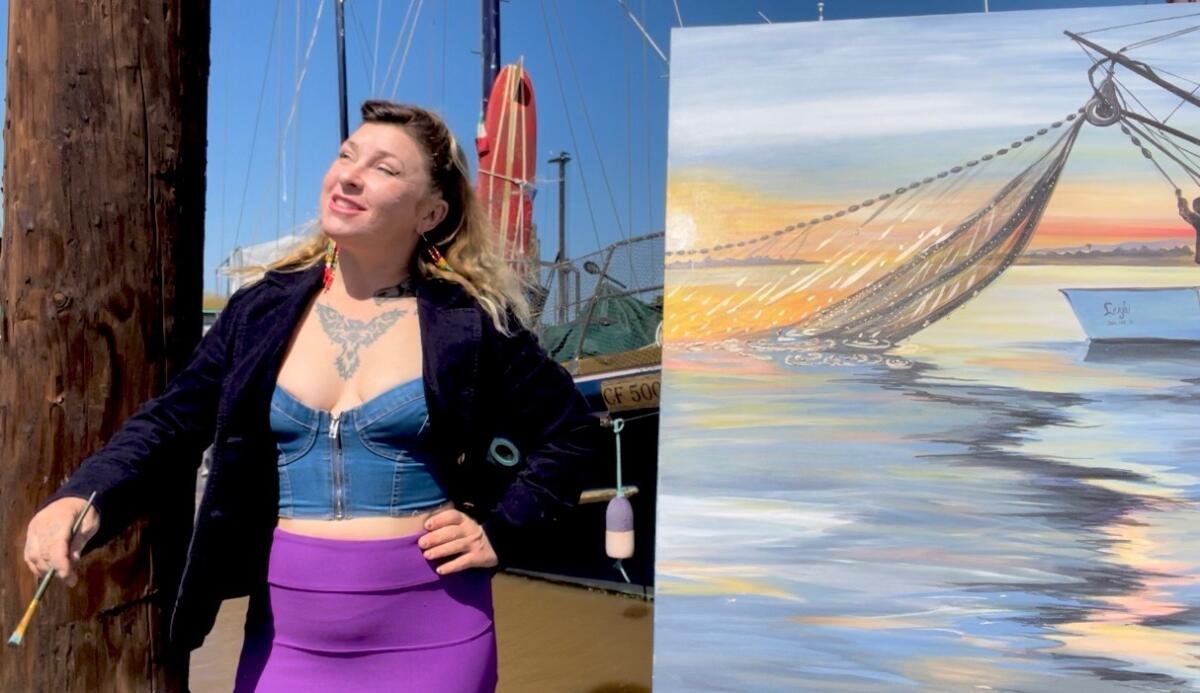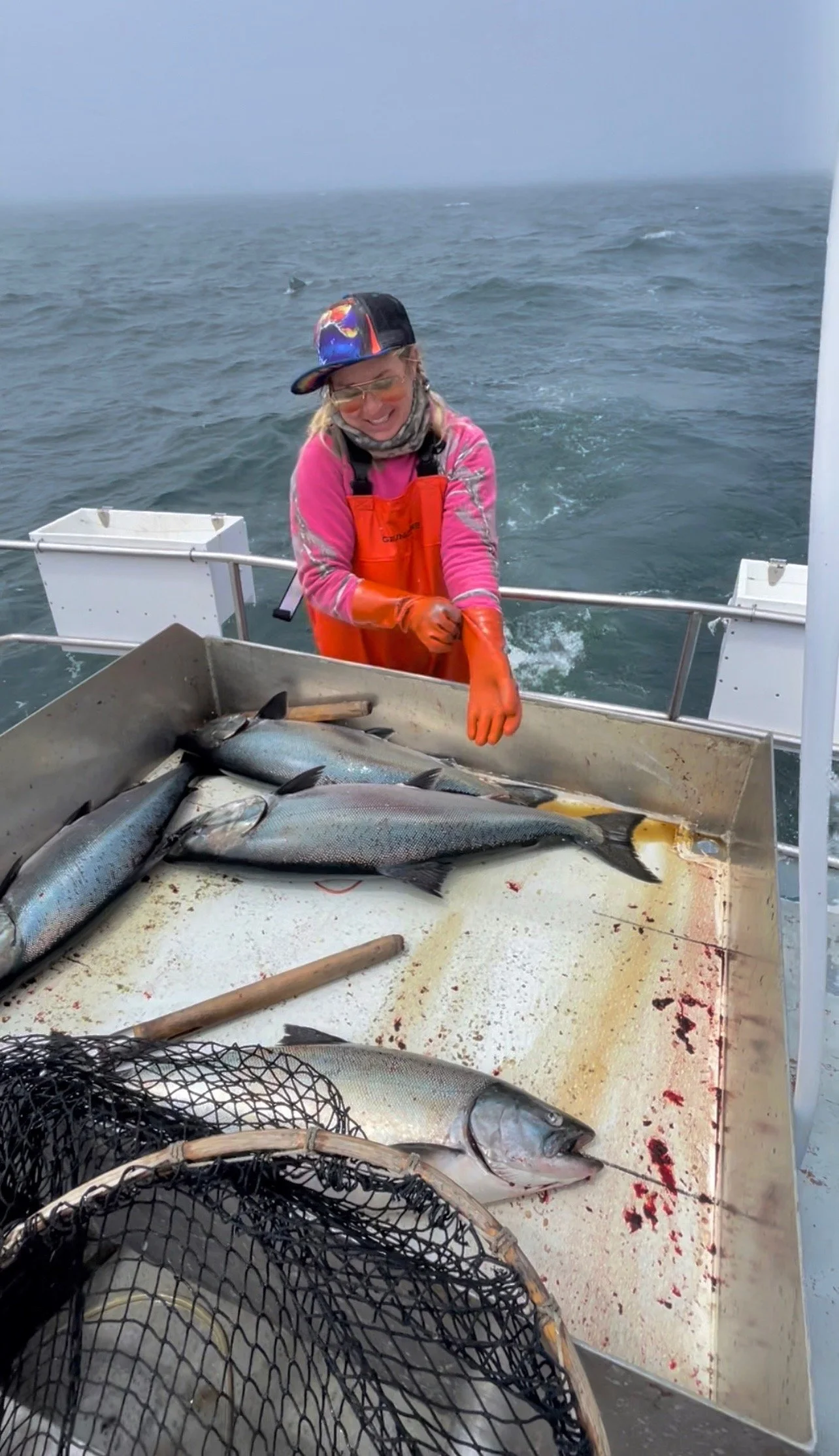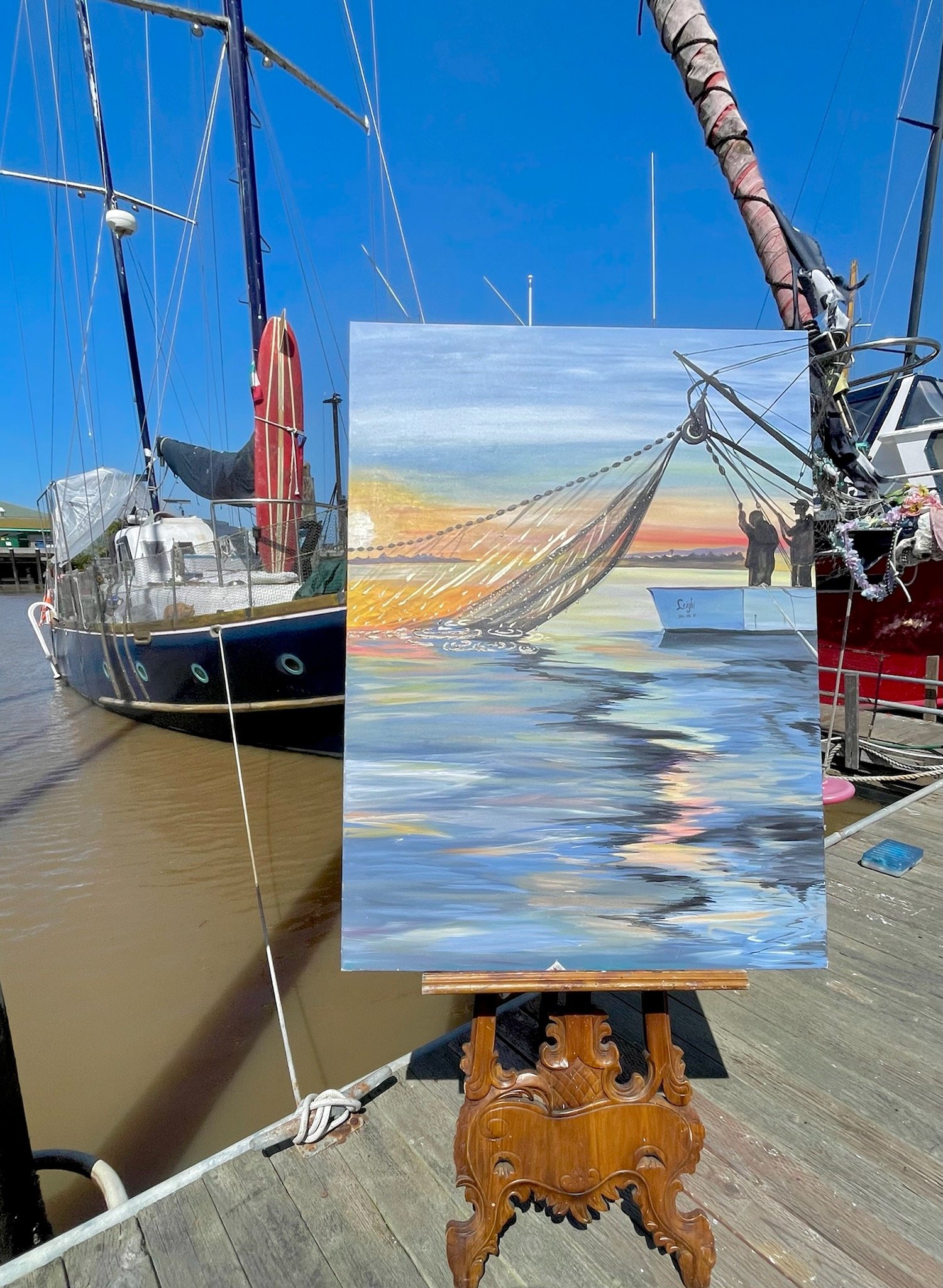Liza Star - Fisher, Artist, Mom; an Incredible Woman
Liza Star was dead. Drowned. Before age 3.
She had fallen into a freezing Rhode Island pond near her childhood home and stayed there long enough that she shouldn’t have survived. Only she did. The Providence Journal newspaper she has saved—published Friday, May 13—reported she evaded brain death by a miracle of hypothermia that preserved her neural network. It didn’t predict what might result.
“This has led me to live a life with the sense of borrowed time owed to cold water,” she says, 37 years later. “I live on the edge of the world in faith, not in fear.” Another cosmic sort of thing emerged from that cold stream: a fundamental partnership with water. “I feel my connection with water is ethereal,” Star says. “All of us [are] animated electrical brain impulses animating a temporary embodiment. Life has a journey. It has purpose and path. Above all, life has incalculable beauty.
The Providence Journal
“If not for the savory things in life, we might lose the taste of what is exquisite, versus what has been bitter.”
As she navigates a life nearly punctuated so prematurely, she’s trying to squeeze every drop from it. A massive part of that involves communing with cold Pacific seas by fishing vessel, surfboard, marine-inspired murals and the Moss Landing harbor where she lives on a boat.
Rick Ryan has a front row seat for that. They met in Moss Landing harbor, where she observed his gradual build out of the F/V Leighi. He asked her if she wanted to go fishing, and she jumped at the chance. Many of her jobs on deck rank among the toughest, from stacking the cork line to sorting species and size. Thanks to her background in marine machinery, she also helped with a lot of the maintenance and even minor emergency repairs while at sea. Now she mans the power skiff. “By far the most difficult task to perform, I know, I’ve done it,” Ryans says. “Poor girl, but she loved it.”
Star remembers his reaction to her skillset. “When I started fishing with my captain he said, ‘You must've been fishing in another life.”
He also observes her enthusiasm for painting—in fact, he originally hired her to do the lettering on the Leighi. “I see Liza with a lot of interests,” Ryan says. “She does or at least tries anything that comes her way, all this while being a mom too.”
The Fisheries Trust presented Star with some questions to better explore and understand her rampant passions. Here appear the inspiring thoughts that surfaced, much like she did from seemingly certain death.
Monterey Bay Fisheries Trust: You’ve pointed out that fishing is a “brutal” industry and that—paraphrasing here—it’s one of your happy places. How can both things be true?
Liza Star: Fishing requires relentless perseverance—not just through the physical elements of an ever-changing sea state, but by requiring resilience to fickle political and environmental contexts.
Rules of engagement are always changing both on land and at sea. Yet, the respite one can find in the escapism of the lifestyle is some kind of complete mercy. Once you have let [out] lines and the gear is in the water, the sheer thrill of anticipating a successful gamble is pure adrenaline and adventure. Like surfing, all distractions are eliminated and it’s you, within an entity requiring your complete immersion.
Fishing is not without physical and financial punishment. It is not for the faint of heart. However, the reward of countless sunsets and sunrises against a diamond glittering horizon cannot be measured.
What inspires, drives and draws you to the artistic projects you are always diving into?
Art is a state of mind. It also favors hereditary generations. My great-grandmother Florence Huling-Schmidt was a trailblazing flapper who graduated young from the renowned Rhode Island School of Design during a time when women were domesticated. She was teaching classical wood-carving architecture, among other impressive portfolio work, during the 1920s. I feel her spirit walks in time with my own. I learned to draw, sculpt and paint at a young age and it distinguished me as unusual.
Having had a tumultuous youth ultimately led me to being a displaced teen. Art and an ocean lifestyle helped me face and heal complicated emotions. The ocean has always been a source of comfort, constant stability, and a place to challenge my own personal growth. I have great admiration for the sea. I’m like Moana: It calls me. I feel often like a humble servant just documenting her beauty in tributary seascapes. I am also inspired by other survivors and hold peace for those who go before me. Memorial art and portraits are something that gives my art a place of greater purpose.
Unlike a photograph, art embellishes the unseen features of a person or experience, you can realize multidimensional perspectives that PhotoShop cannot authenticate. I feel art moves through me and I am just an instrument. I love to create both residential and commercial, transforming inland areas to windowless seasides or doing traditional hand-painted boat lettering to honor the historical superstition of bringing good luck to a vessel.
How the heck do you balance all the demands of parenting, creative work and commercial fishing?
Having been a single mother over 50 percent of my adult life, I admit it has been quite the challenge. I started as a teen mom in state custody, where there wasn’t much room to contemplate what I desired, versus what was required. However, when I had my second child in my 30s, I was better able to design my life to emulate who I wanted to be. My second child’s father was a commercial fisherman while I was still focused on marine mechanics and custom boat lettering. When he “floundered,” one of my sisters gave me great advice, which was: be the things you wish you could find in a partner. I was weary of working boatyard to boatyard lugging tools and longed to be at sea away from both clients and merciless parenting.
Working a night fishery allowed me to be both a present parent and find peace beneath the stars. It also allowed me some leisure during the day to focus on engaging in more art. Indeed, it is an alternative lifestyle, but I have never felt more balanced or fulfilled.
I’ve been very lucky the last few years to have met my match, another fisherman after my own heart. We are specialized in complementary seasonal fisheries, meaning one of us is home with the kiddo while the other is out on the bay. My 6-year-old has been both blessed and cursed with a mermaid's heart and she can cast a small net, fishing pole, or crab buoys no less than as she was born into it. Sport fishing has become a fun complement to our family time.
What would you do without the ocean?
I cannot imagine life without the Big Blue. I grew up in Rhode Island, the so-called “Ocean State,” with the motto “Hope” cresting a colonial anchor. Even when I drove a U-Haul cross-country to California, I swam in Lake Eerie after one day away from the Atlantic and swam in Lake Tahoe as soon as I crossed into California. Although lakes are beautiful and majestic, I find their stillness to be unsettling. I love the living and changing tidal waters of the deep and shapely oceans.
When I can’t be in the ocean I meander upriver to remote hiking areas, and when I sit and meditate in the trees I hear the seas echo their roar in the sway of wind upon leaves and branches in the canopies, and I imagine waves crashing incessantly at a weathered shore. Dark skies with bright stars and vertical inviting rock faces hold refuge for me prior to falling in love with surfing and being offshore.
Although I have always had the ocean in my backyard, there was a time I spent more hours bending strings on my guitar or writing siren songs on electric keys. I have a library of original music as I work on releasing a 30-plus song anthology of life tribulations, loves and losses—and, of course, ocean semantics.
What are some of the interesting ways your Rhode Island relationship with the ocean informs and/or contrasts with your Santa Cruz-style romance with the water?
Rhode Island and Santa Cruz [provide] a parallel universe. We have both underground and commercial surf cultures. Tight localized communities, small businesses, healthy art culture too. We once had one of America’s first amusement boardwalks, called “Rocky Point.” In addition, beach and rocky reef breaks during hurricane season and winter snow storms have surf notoriety. I worked in the heart of a beach town for an outboard dealership, launching and picking up mostly Boston Whalers from private docks in the bay crevices, servicing engines, and test-riding small boats.
I had a surf soul father, a local Cherokee, who made his surf check every morning on his rusty beach cruiser. When I “transplanted” here to Santa Cruz my first boat captain was also Cherokee and became like a father figure too, giving me a view of California coast from the helm of a 55-foot Westport retrofit F/V employed as a research vessel.
I worked for three years with Moss Landing Marine Laboratories crewing, deploying and retrieving scientific instruments. This was a life-shaping experience, as my captain was a Vietnam veteran with whom I spent many days listening to his recollections and convictions. He died unexpectedly from Agent Orange-related throat cancer. He was opinionated and passionate but instilled in me a deep-water understanding of the ocean beyond the surface: wind, current, patterns in color and temperature and his favorite soap boxes—the salmon fisheries and irrigation—were hot topics of which he bore knowledge into me like a dry drill bit.
Out in the lineup here, surfers in deep waters during challenging conditions welcomed my high spirit, and for those who did not, I let my presence hold its own space. Having come from surfing with men who wore icicles on their beards made these cold waters feel warm and even bitter local attitudes couldn’t keep me away from waves. Out in the lineup, I sing to myself and chose my waves cautiously. I always give thanks when my feet hit the water. I have lived here in Monterey Bay for 13 years, and I have spread the ashes of both of those soul fathers from both the East and the West.
Why is it important to you and your peers to evolve our distribution to empower local fisher people and local seafood lovers?
Great question—thank you for asking. Fishermen these days are fully invested.
On land, most of us trouble ourselves with rising fuel costs and market price of eggs—variables that represent economic vulnerability. For commercial fishermen, unprecedented weather systems alone have pressed F/Vs across the California Coast to stack gear or risk attempting to recover it. Rough seas are the least of it. There are also delays in season openers, early and/or indefinite closures, rising whale populations, to mention just some of the top socio-eco interchangeable variables impacting a high-maintenance weather-dependent food supply.
Meaning, when fishermen offload at wholesale prices, they barely break even. When food is purchased wholesale, it then changes hands between offload, preparation, and sale. At the same time, nothing can compare to seasonal catch enjoyed fresh from the boat. My “fisher-Man” and I are working together to accept pre-orders as we develop repeat buyers through local dock sales in Half Moon Bay.
We love being a small family selling to small families. We always try to talk to the kids and parents about the fishing lifestyle and share salty humor as part of the experience. There is something very special and primal about knowing exactly where your food comes from. The food is more than just delicious, nutritious and fresh, it is flavored with intention and diligence.




